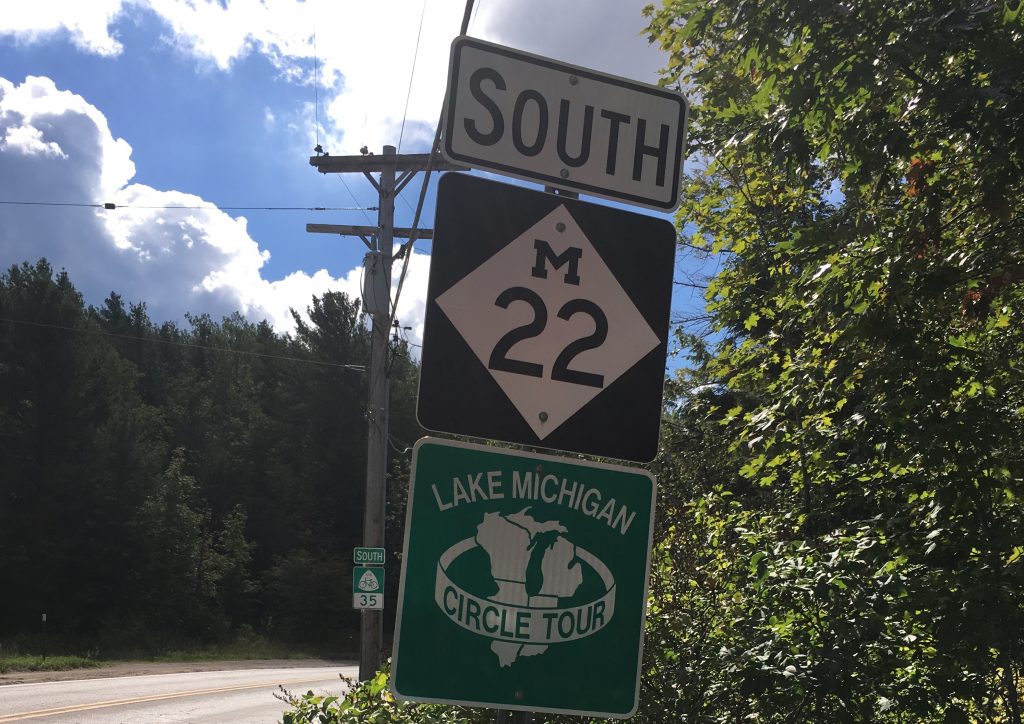State, Local Business Fight Over Iconic M-22 Highway Sign
Michigan Attorney General Bill Schuette has filed a lawsuit challenging the M-22 trademark.


There’s a fight over a simple black-and-white sign that identifies a state highway that runs through a popular vacation and resort region in northern Michigan. A business claims it has the exclusive right to use it as a product brand. The state says otherwise.
Now, the dispute is in federal court.
The M-22 highway in northern Michigan is considered one of the nation’s most scenic drives. For 116 miles, it hugs the Lake Michigan shoreline, and offers stunning views of woodlands, cherry orchards, and vineyards.
The M-22 highway sign has become iconic. The black-and-white logo graces cars, t-shirts and glassware, among other things, all sold by a local business.
For visitors to the areas, like Jodi Olson of Aurora-Illinois, the M-22 logo is a happy reminder of being “up north” in Michigan resort country. She has an M-22 sticker in the upper left corner of the tailgate on her SUV.
“God’s country, is what I say. It’s beautiful. The water, the– it’s just absolutely gorgeous,” says the Traverse City native.
The M-22 business was started a dozen years ago by a couple of other locals, Matt Myers and his brother Keegan. It started as a t-shirt business. Then they slapped the logo on a on a wider variety of retail products and souvenirs. They even have an M-22 wine label.
“We created something,” says Matt Myers. “A brand like ourselves never existed before. Nobody was selling shirts like this, or created a brand like this around something like the road.”
The Meyers say the M-22 brand represents their love for the area where they grew up. The brothers trademarked the logo in 2007. Myers says the trademark protects their business, and their customers from cheap knockoffs.
“It’s all about the thought and the detail and the love and the passion that we’ve put into our brand,” he says. “That’s what’s made it into what it is today.”
Myers is quick to point out the trademark does not mean he and his brother own the M-22 logo – it simply allows them to keep products similar to what they sell out of the marketplace.
“Anyone can do anything they want with it as long as it doesn’t confuse our customers.”
Myers says that means an M-22 towing service, and M-22 party store, or an M-22 tax accountant can all use the logo without running afoul of the trademark because those businesses are not competitors.
But the M-22 company says the Good Hart General Store is a competitor. The store is located on another northern Michigan scenic route. M-119 is sometimes called the “Tunnel of Trees,” and it runs roughly 30 miles along Lake Michigan.

The M-22 company said the Good Hart General Store’s M-119 wine label was too much like its brand, and sent a cease-and-desist letter. That’s when Michigan Attorney General Bill Schuette got involved. He declared state highway signs are in the public domain for anyone to use, and he filed a lawsuit challenging the M-22 trademark.
“M-22, the American flag, the state Capitol, the US Capitol – It’s everybody’s flag, everybody’s Capitol, everybody’s road, so nobody can stop others from taking their picture, putting it on a t-shirt, and trying to market it,” he said.
“I don’t know that there’s anything exactly like this, but I think the state has a tough hill climb here,” says Mark Janis, the director of the Center for Intellectual Property Research at Indiana University Maurer School of Law.
Janis says a highway sign doesn’t really compare to the flag or the Capitol, which under trademark law are considered “insignias” – official symbols of government authority.
“You’d have to prove that that mark, the road sign, is an official insignia of the state,” he says.
“But there’s at least a question as far as I can tell whether a road sign of this type would be deemed an official insignia of a state. I think that might be a little bit hard for the state to prove here.”
Janis also doubts the M-22 company would win its argument that the M-119 sign is too much like its logo. But that question is not before the federal court.
In the meantime, the Michigan Department of Transportation has its own issues with the popularity of the M-22 highway sign. People keep stealing them, and they’re expensive to replace.

